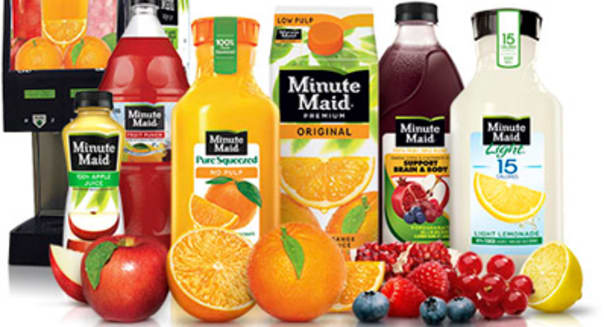How Coca-Cola Built Up Its Business Way Beyond Soda
Filed under: Coca-Cola Company, Mergers & Acquisitions, Consumer Goods, Food & Beverage, This Built America

As demonstrated by its recent purchase/asset-swap deal with energy drink company Monster Beverage (MNST), Coca-Cola (KO) is more than just a slinger of soda. The company draws billions of dollars in revenue from a other liquids, including Dasani water and Powerade sports drinks.
That’s par for the course in the sugary beverage industry. Coke’s eternal rival PepsiCo (PEP) does a brisk business selling drinks that aren’t soda, such as the Starbucks (SBUX) ready-made concoctions it offers in partnership with the coffee giant. PepsiCo, in fact, draws most of its revenue from food products. These include notable brands such as Doritos and Quaker Oats.
Diversification is key in this business; there’s only so much cola the world is willing to drink. With that in mind, here’s a look at a trio of influential asset buys Coke made outside of its signature fizzy product line that have molded it into the behemoth we all know and love and will continue to shape the company.
Minute Maid (1960)
The history of Coca-Cola as a brand and company can be broken down roughly into three eras — the soda fountain era (beginning when Coke was first served in 1886 to 1898), the bottle era (from 1899 to 1959), and what we can call the diversification era (from 1960 to the present).
The latter began when Coke made its first non-soda buy that year. Through a stock swap it acquired the now-familiar line of orange juice products, notable for being the first such juice available in frozen concentrate form (making it available year-round no matter a customer’s location).
From then on, Coca-Cola became a company selling more than only carbonated beverages. This was a smart move — these days, the firm boasts 11 non-soda brands that each take in more than $1 billion in revenue. They’re Minute Maid (U.S.), Del Valle (South and Central America), Georgia (Japan), Aquarius (Japan), Powerade (U.S.), BonAqua (Hong Kong), Sokenbicha (Japan), Dasani (U.S.), Vitamin Water (U.S), Simply Orange (U.S.) and Minute Maid Pulpy (China).
Columbia Pictures (1982)
The early 1980s marked a brief era when Coke ventured far out of the beverage business to diversify.
The target asset was Columbia Pictures, a storied Hollywood movie studio. Coke made an overwhelming bid for the company of $750 million, and just like that, it was in the film business.
The results were mixed. The studio had success with several releases (like the enduringly popular underdog story “The Karate Kid”), but also unloaded the comedy “Ishtar” on the world. The expensive, poorly reviewed film became one of the most notorious bombs in Hollywood history.
In spite of Columbia’s wins (which also included TV hits thanks to Embassy Communications, a small-screen production outfit it bought in 1985), it couldn’t escape the hit to its finances and reputation incurred by the $40 million loss from “Ishtar.”
It was time for Coke to return to fundamentals, and in 1989 it sold the bulked-up Columbia to a much more entertainment-oriented company, Japanese electronics giant Sony (SNE), for a fizzy $3.4 billion.
Keurig Green Mountain (2014)
Sometimes it’s better to take an anchor stake — and reach production, distribution and marketing deals with a target company — rather than buy it outright.
That seems to be the ambition for Coke with the Monster Beverage deal, as well as the arrangement it reached this past February with Keurig Green Mountain (GMCR). For $1.25 billion, Coke took a 10 percent stake in Keurig (later raised to 16 percent), maker of the K-Cup beverage pod brewing system.
The two also signed a 10-year agreement to mutually develop Coke-branded offerings for the latter’s Keurig Cold at-home drink-making device.
Cold is a clear attempt by Keurig to grab some do-it-yourself-soft-drink market share from SodaStream (SODA), which has seen its sales grow robustly over the past few years. There’s money to be made in this market, so Coke and Keurig are making a lunge for it.
Expanding by Degrees
Might this be the future for Coke: purchases of minority stakes and co-development deals? The company’s acquisitions have historically been full-on buys rather than strategic purchases.
The Monster Beverage and Keurig deals indicate a more cautious approach for the soda maker, as befits its stature as a conservative enterprise investors can rely on for profits and dividend income. Time will tell if this style of expansion will sweeten Coke’s results or not.
Motley Fool contributor Eric Volkman has no position in any stocks mentioned. The Motley Fool recommends Coca-Cola, Keurig Green Mountain, Monster Beverage, PepsiCo, SodaStream and Starbucks. The Motley Fool owns shares of Monster Beverage, PepsiCo, SodaStream and Starbucks and has the following options: long January 2016 $37 calls on Coca-Cola and short January 2016 $37 puts on Coca-Cola. Try any of our Foolish newsletter services free for 30 days.
Permalink | Email this | Linking Blogs | Comments
http://www.dailyfinance.com/2014/08/30/coca-cola-business-diversification/
